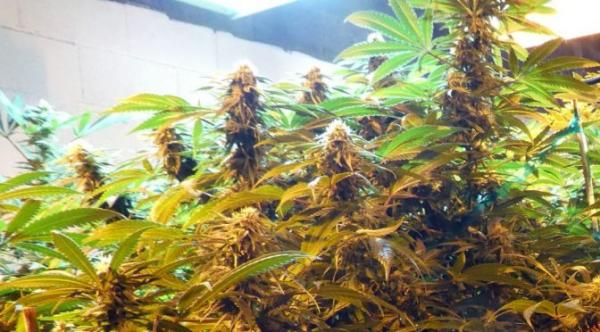With hemp bill passed, where do other cannabis bills stand?
November 15, 2017 Gary Storck Leave a comment Edit
While state lawmakers finally came together and unanimously voted in both houses the same week to pass SB119, the industrial hemp bill, now awaiting the signature of Wisconsin Gov. Scott Walker, the prognosis for passage of other cannabis-related legislation this session appears dim.
Despite strong public support, the legislature’s Republican majority has been very cool to moving bills that would legalize the medical and recreational use of cannabis.
Rep. Chris Taylor (D-Madison) and Sen. Jon Erpenbach (D-Middleton) address 2013 press conference announcing medical cannabis bill (Cannabadger.com)
2017 Senate Bill 38/Assembly Bill 38, sponsored by Rep. Chris Taylor (D-Madison) and Sen. Jon Erpenbach (D-Middleton), were assigned to committees chaired by lawmakers who have been extremely hostile to medical cannabis, Sen. Leah Vukmir (R-Brookfield) and Rep. Joe Sanfelippo (R-New Berlin).
Despite overwhelming supermajority public support for medical cannabis, and a recent tour promoting the bill by Taylor and Erpenbach with stops in La Crosse, Wausau, Green Bay and in Vukmir and Sanfellipo’s districts in West Allis, no progress has yet been made on scheduling public hearings this session.
In January 2017, Speaker Robin Vos had said, “If you get a prescription to use an opiate or you get a prescription to use marijuana, to me I think that’s the same thing. I would be open to that.”
Despite Vos’ comments, Wisconsin seniors, veterans, disabled. sick and dying continue to wait for lawmakers to act.
Melissa Sargent discusses AB 482 7/13/2017
The July 2016 Marquette Law School Poll found 59% of Wisconsinites support legalizing cannabis like alcohol, a number now certainly higher 17 months later. Yet AB482, legislation that would legalize cannabis for adult use authored by Rep. Melissa Sargent (D-Madison) also has not been scheduled for hearings nor is it likely in the GOP-controlled legislature.
This comes despite the fiscal estimate for AB482 from the Wisconsin Dept. of Revenue which forecasts that “sales of marijuana would increase state excise and sales tax and fee revenues by $60.5 million in FY19 (Fiscal Year 2019), $109.5 million in FY20 and $138 million in FY21.”
So a majority of citizens support it, it would bring in millions of dollars in new revenue, save criminal justice costs, address racial disparities of the war on drugs, save lives from opiate abuse, along with other positives, but a majority of lawmakers still refuse to even let the public weigh in at a hearing, much less even consider it.
The mood in the Assembly against legalization is reflected in recent comments from Rep. Joel Kitchens (R-Sturgeon Bay) who recently told a listening session in Algoma that not only would AB482 not “make it out of committee, but that he believed there would never be a vote on it in his lifetime.”
Legislation that would place a statewide advisory referendum on medical cannabis on Nov. 2018 ballots from Rep. Taylor and Sen. Erpenbach 2017 Assembly Joint Resolution 7/2017 Senate Joint Resolution 10 also remains stalled, despite being listed as “Available for scheduling.”
Since a medical pot advisory referendum would attract more younger and progressive voters which could skew other races away from Republican candidates, GOP lawmakers are unlikely to consider such a move, despite Gov. Walker’s own 2012 comments to the Associated Press that the only way he sees legalization happening is “if state residents approve the idea in a referendum similar to Colorado and Washington.”
Sen. Fred Risser and Rep. Adam Jarchow (Wisconsin Legislature)
A bipartisan measure that would decriminalize possession of up to ten grams of cannabis 2017 Assembly Bill 409/2017 Senate Bill 318 remains in committee with no hearings currently scheduled. The decriminalization proposal is unique that while authored by Rep. Adam Jarchow (R-Balsam Lake), it has a Democratic sponsor in Sen. Fred Risser of Madison. Currently, no hearings are scheduled in either the Assembly Committee on Criminal Justice and Public Safety nor the Senate Committee on Judiciary and Public Safety. Rep. Jarchow’s office said they are unsure if AB409 would receive a hearing. The office of Assembly Committee on Criminal Justice and Public Safety char Rep. John Spiros (R- Marshfield) said that they are reviewing all bills in committee and deciding which ones may yet get hearings in the remaining time this session, including AB409. The office of Senate committee chair Sen. Van Wanggaard said they did not know the current status and would get back to me next week. Hopefully the bill will receive a hearing but with limited floorperiod time scheduled for the remainder of the session, even if it does, chances of votes by either house could be limited.
So while Wisconsin lawmakers did approve 2017 Wisconsin Act 4 at the beginning of the year, legalizing CBD possession with a doctor note as well as the industrial hemp bill, it’s very unlikely other very worthy bills with majority support will once again die in committee without public hearings or votes.
While there probably won’t be a medical cannabis advisory referendum before voters in Nov. 2018, cannabis supporters can still make it a referendum on cannabis policy by showing up and holding accountable legislators who stand in the way of public opinion.
2018 elections races include Wisconsin governor, attorney general and all 99 state representatives and half the 33-member state senate. One Democratic candidate for governor, Matt Flynn, just announced that he supports cannabis legalization. Voters who support medical and adult use legalization of cannabis will need to show up in sufficient numbers to change enough faces at the Capitol from the top down to make legalization a priority in the 2019-2020 session.




